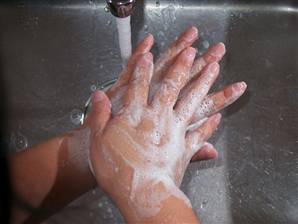
Oh, the tough decisions we face each day. Work or stay home with a sick child? Paper or plastic? Raspberry(木莓) or peach jam(果酱)?
Jam?
In the grand scheme(方案) of moral dilemmas(左右为难), you’d think jam would rank somewhere below, say, choosing whether to drill(打钻) or protect the environment.
But it’s one of the confounding(使混淆的) choices researchers gave college students in a study exploring(探索) “cognitive dissonance(认知失调),” the uncomfortable feeling we get when we hold two opposing(对立的) ideas in our minds, or regret a decision we've made.
In the way that a religious baptism(宗教中的洗礼) symbolically gives us a moral clean slate(清白历史), University of Michigan professors Spike W.S. Lee and Norbert Schwarz discovered that washing our hands after making a choice actually helps us alleviate(减轻) the discomfort(不适) of accepting the decision.
As part of the study, a group of college students had to choose one of two different fruit jams, and then rated how they expected both jams to taste. Those who washed their hands after choosing expected both jams to taste roughly the same, while those who didn't wash hands expected the jam they chose to taste much better than the other one. The research suggests that had this group washed their hands, they would not have needed to rationalize(为某种行为找理由) their initial(最初的) choice by saying it was better than the other one.
In another experiment, researchers had the students rank 10 CDs and then chose one to take home. They found the same result as with the jam: those who didn’t wash their hands seemed to feel they needed to justify(为……辩护) the way they ranked them.
While decisions about CDs and jams are admittedly lightweight(不重要的), Schwarz said there was no need to expose research participants(参与者) to dramatic, emotionally charged decisions that could have upset them, given that previous research has shown that small decisions are sufficient to induce(导致) dissonance.
The research is important, Schwarz says, because it illustrates that metaphors(隐喻) have a powerful effect on human thinking.
"We often talk about a 'clean slate' or 'washing one's hands of something,' and it seems that hand-washing can indeed wipe one's slate clean," Schwarz said.
So the next time you want a clean conscience after making a simple decision, head to the nearest sink and wash away the second-guessing(事后劝告).

